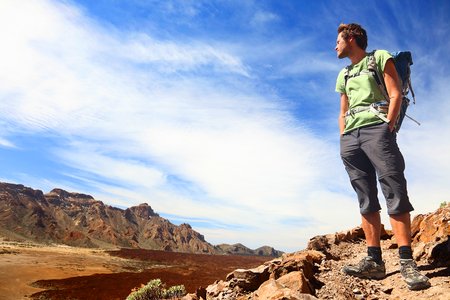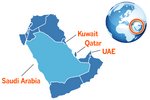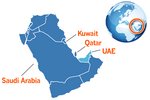Practical Tips From an Experienced World Traveller
By: Lee Ann McGillivray, BSN, RN
 One of the many benefits of working for hospitals in the Arabian Peninsula is that they offer lots of vacation time — the average is about seven calendar weeks per year, often more. And living in the Arabian Peninsula means you're that much closer to Asia, Southeast Asia, India, Africa, Russia, and Europe than you are back home in the USA or Canada. Which means that you have no excuse not to take that trip you've always dreamed of. Pack less than you think you will need … and leave the jeans at home.It doesn't matter how big my wardrobe gets, I find that I always cycle through the same handful of outfits. And it's the same when I travel. So forget bringing a shoe for every outfit and an outfit for every possible occasion. (And jeans weigh a ton, are hot, and take forever to dry.) In fact, the best way to pack is to lay out everything you think you will need. Then go through it again and say to yourself, is this something I really want to carry on my back for an hour when I get to the airport/bus stop/train station and can't find a ride into town? During our yearlong trip overseas, I was grateful for my small pack — less than 17 kilos (37 lbs) — every single day. Especially the day in Indonesia when my husband suggested we walk the "only 20 minutes" to the ferry. An hour-and-a-half later, I was melting from the heat, but still able to carry on — and my pack was small enough to throw at my husband when we found out the ferry was full and that we'd have to come back the next day! If you don't like wearing it now, you won't like wearing it every day on the road.The corollary to the above is that if you're bringing only
the basics, be sure you like wearing those basics. More than
once I have packed something that I couldn't stand wearing
at home — it's a bad colour, it's too big/small, or I just
didn't like it — thinking that since whatever I bring is
going to get some hard wear and tear, I should bring
something that I will be happy not to bring back. And, I
don't want to wreck my favorite pieces, do I? Then after
wearing the annoying article for a couple of days, I am
reminded why I never wore it at home … But pack as much underwear as you can carry!The one exception to the less-is-more rule is underwear. If you don't want to get stuck handwashing your underwear every night before bed, bring at least a weeks' worth (I actually pack about two weeks' worth). The first extended trip I took was to India, Nepal, and Thailand. As it was my first backpacking trip ever, I followed the guidebook's packing list to the letter. Their entry on underwear said something to the effect of: you only need two pairs, one to wear and one to wash. So that's what I did. I even bought these special "travel" underpants. They were supposed to be quick-dry (but weren't) and they went up to my armpits (so much for a holiday romance!). And they were white, which, in retrospect makes no sense — if you have only two pairs of underpants and the only washing "machine" they will likely be seeing is your two hands, wouldn't it make more sense for them to be black? (After less than a month on the road, mine were a sad shade of grey … I am still amazed that I met my husband on that trip.) Try to retain some perspective.There are many countries around the world where traveling on American dollars puts you at a huge advantage. Your budget for only one day in a Western country could easily cover a week in a developing country — for two people! In countries in Southeast Asia (with the exception of Singapore), India, and Nepal, budget travelers can easily find a decent room for less than US$5-10 per night, and eat a tasty and filling meal for less than US$1. In fact, it's so cheap to travel in some of these countries that if you do it for too long, you can really lose your perspective on what is a "normal" or fair price. For example, while traveling in Myanmar, I regularly ate these tiny hardboiled eggs for breakfast. For 2 Kyat (30 cents) I would get six in a bag. Well, one morning the lady selling them was asking for … 3 Kyat!! Puzzled, I held up two fingers. She shook her head and held up three fingers. I put on my most disapproving look — how could she try to overcharge me this way? — shook my head, and walked away. That's right. I walked away from this skinny little Burmese woman who was just trying to eke out a living by selling bags of tiny hardboiled eggs for 45 cents. As I turned away, some small part of me — the human side, I think — woke up and stopped me, and, recognizing my ridiculous self, I turned back and bought the eggs. Patience isn't a virtue … it's a survival tool.Travel in many developing countries can be an exercise in patience and futility. Patience for surviving the long delays, and futility in trying to understand the reasons why you haven't left yet. Sometimes, the reason for waiting is simply that they are waiting for enough people to fill up the bus. I encountered this during every bus journey in Indonesia. But even when the bus seemed to be full, it still wouldn't leave. Hence, the futility of asking, "Why aren't we leaving?" (Which I must have asked my husband at least a million times at the start of each trip.) But patience is also required for surviving the often incredibly long travel times in many developing countries; multi-day ferry/boat rides, overnight train rides, and 12+ hour long bus rides are a common feature of being a budget backpacker. Throw away your guidebook … or, at least, leave it behind occasionally.In addition to the backpack and the unwashed clothes, a common feature of the independent backpacker is the guidebook. Although there are many guidebooks available (Frommers, Barefoot, and Let's Go), the most popular seems to be the ubiquitous Lonely Planet. I don't think any one guidebook is particularly better than another (although I tend to use Lonely Planet myself). They all offer a good general overview of a location, and suggestions for things to see and do, and places to eat and sleep. But it can be easy to become too reliant on the guidebook, to discount a town to visit, or a place to eat, just because it's not in the book. The only way to break this habit is to leave the book behind occasionally. Wander the city without it. Stop at a restaurant because it's hopping with locals and the food smells delicious. You never know what find you might stumble across. Take all tips from other travelers with a grain of salt.Having said all of this, the most important thing to remember is that it's your trip. Pack what you want, do what you want, eat what you want. I don't know how many times I met people on the road that started the conversation with, "Well, you should have been here five years ago …", as though the place is no longer cool enough or independent enough (whatever that means) and there's no point in staying. Or the people that judge others for eating the occasional McHamburger or carry a wheelie-bag instead of a "proper" backpack. It's your trip. Figure out what makes you excited and do that. Or if you don't know, do a bunch of different things and try to find out. And if you really want to bring your favorite pair of jeans, bring them … just don't get them wet! Most Popular |
Related |
Copyright (C) 2025 Helen Ziegler and Associates. All rights reserved.



